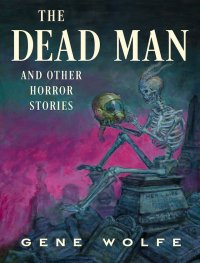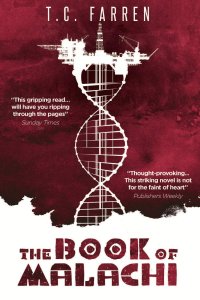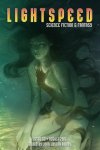Paul Di Filippo Reviews The Dead Man and Other Horror Stories by Gene Wolfe
 The Dead Man and Other Horror Stories, Gene Wolfe (Subterranean Press 978-1-64524-120-1, hardcover, 400pp, $50.00) June 2023
The Dead Man and Other Horror Stories, Gene Wolfe (Subterranean Press 978-1-64524-120-1, hardcover, 400pp, $50.00) June 2023
It is so thrilling and rewarding to have a new book from the death-lost pen of Gene Wolfe. The man passed away in 2019, and soon thereafter left us a last posthumous novel (Interlibrary Loan [2020]), but even the recency of those occurrences is beginning to seem like distant ages past. The world moves so swiftly these days, with events piling onto each other like sand from an hourglass; with new books and new authors heaving up like temporary behemoths out of the literary sea, that one feels even the real giants of literature may be obscured, swamped, forgotten. Do critics these days still use Wolfe as a benchmark and gold standard of the best that fantastika can produce? Do young readers discover him easily and fall under his spell? A few of his most important works seem to be available on Amazon, but not his whole catalogue. Oh, well, time marches on, and all this has happened to other fine writers over and over in the past. But a nicely curated volume like the current one can stand as an important bulwark against encroaching oblivion, and perhaps even prompt a renaissance of attention.
The overarching motif here is that this assemblage represents Wolfe’s horror stories. But as has been frequently remarked, horror, as a genre, is unique in that it presupposes no particular setting or qualifying suite of tropes. Thus one can have Cowboy Horror or Victorian Horror or Contemporary Horror or SF Horror or Surreal Horror. Wolfe’s talents extend across all these styles, and more.
The author and critic Algis Budrys once remarked that he found Wolfe’s writings to be unique in one particular way. As a professional, Budrys was in the habit of being easily able to dissect another professional’s story and learn the tricks of its composition. But with Wolfe, Budrys discovered that even his discernment could often not unravel Wolfe’s methods. There are certainly some arcane and super-sophisticated tales here, but there are equally many which possess an almost primal simplicity. But perhaps that quality is really the apex of a writer’s craft.
I can’t possibly give details on each of the generous twenty-eight stories here—six of them never before reprinted—so we’ll have to look at some representative samples.
“The Dead Man” hails from early in Wolfe’s career, having appeared in a men’s adventure magazine in 1965, and it has a Dunsanyian quality as it recounts the post-life travails of a simple villager. “When they saw him at last, he could not speak, but looked from face to face, beginning and ending with his wife, conscious of having come to the close of something.” As the kickoff to a long career and to the rest of this volume, it serves as a good launchpad. On an alien planet we encounter sentient houses, motives unknowable. A visitor from the homeworld discovers that these “Many Mansions” are not to be taken lightly. “But the funny thing was what happened when he went past. He could hear it groan. The snow was flying right into his face, he said, but he knew it wasn’t just the wind; the house was sorry he hadn’t stopped.”
“The Detective of Dreams” is the first of several pitch-perfect historical pieces. Our hero must discover the identity and purpose of an evil figure who crops up in the dreams of several clients. Ratiocination and bravery carry the day. With its modern-day setting, “In the House of Gingerbread” successfully updates Hansel and Gretel in a very droll and slangy manner, keeping the reader guessing about who’s the real bad guy until the very end. “For an instant (and only an instant) a white face like a child’s stared from a gable window; then it was gone, and the flames peered out instead.”
I am sure Wolfe—who messed about with mysterious parallel titles quite often, as in “The Island of Doctor Death” and its companions—would have been delighted to have two stories with similar titles appear in the same volume. “The Other Dead Man” takes place on a spaceship plagued by a bad AI and some zombie astronauts.
Nell Upson’s drifting corpse watched him with indifferent eyes until he pushed her away, sending her deeper into the dark recesses of Section Three to join her fellows. In time, space would dry Nell utterly, mummifying her; radiation would blacken her livid skin. None of that had yet taken place, and without air, Nell’s blood could not even coagulate—she had left a thin, crimson tail of it floating in the void behind her.
Full of suspense, it has a hell of a kicker at the end.
There’s resonance with the xenological SF of Michael Bishop (the work of Wolfe and Bishop intersected at many points) in “The Seraph from Its Sepulcher”, as Doctor Anthony Brook investigates a world where the major native lifeform is thought to be extinct. But doubt remains. “The labyrinthine stone stairs gleamed like new-minted gold in Brook’s holoscreen, flawlessly lit by the morning sunshine. At the top, the graceful Seraphic mission church seemed a pretty toy. Such a toy, Brook thought idly, as real angels might have built for the Christ child’s crib set. Except—”
Wolfe authentically inhabits a Russian fable in “The Death of Koshchei the Deathless,” as Prince Ivan the simple recounts a tangled and gruesome family history. Like any good son, Ivan bears a jigsaw of linear tattoos on his body indicating the parts into which his father was hacked.
My absolute favorite tale is “Bed and Breakfast,” which opens thus: “I know an old couple who live near Hell. They have a small farm, and, to supplement the meager income it provides (and to use up its bounty of chickens, ducks and geese, of beefsteak tomatoes, bull-nose peppers and roastin’ ears), open their spare bedrooms to paying guests. From time to time, I am one of those guests.” This Zelaznyesque tale of fated but fraught lovers is both melancholy and life-affirming.
“My Name Is Nancy Wood” is one of those stories I mentioned that hew to an utterly straightforward expository style and clarity, yet which somehow manages to create the most macabre and unsettling effects, all in a very short span. A young nurse tends to a dying patient with remarkable recuperatory powers. Wolfe’s evocation of sexual tension is also excellent.
We saw sentient houses earlier, but what of the intelligence underpinning “Hunter Lake”…? A mother and daughter confront this aquatic monster, and their fraught parent-child relationship determines their fate.
Another vivid period piece is “Why I Was Hanged”, which chronicles the plight of a valet who must choose to defend his beloved master, or an innocent woman who manifests on the astral plane.
There is not one of the visitations I endured that is not burned forever in my memory, but none is seared more clearly or more deeply than the first. I lay abed, having slept soundly, I believe, for some hours. Waking, I saw bending over me a maiden of mist whose hair was night and whose eyes were stars. Her hand moved toward my face—it stroked my brow, and I was conscious of no touch but only of a sensation of cold, as though I slept before an open window through which snow had blown.
Lastly comes “Uncaged”, wherein a man releases a monster through an act of kindness. The whole tale bears the ambiance of a lost film by Val Lewton.
Wolfe’s trademarks are everywhere in this volume. His penchant for unreliable narrators; his ability to contrast saintliness and evil, sometimes within the same character; his offhand depiction of seemingly trivial incidents which by story’s end prove to be of utmost portent; his ability to discern ancient lineaments beneath the façade of modernity; his privileging of an ethical life while remaining sympathetic to those who fall short— In summary, Wolfe’s moral and narrative complexities operate just as wonderfully at the short story level as they do in his novels, and the ostensible foregrounding of classic horror tropes hinders his voice not one whit. He was able to transform all he touched into pure fabulaic gold.
 While you are here, please take a moment to support Locus with a one-time or recurring donation. We rely on reader donations to keep the magazine and site going, and would like to keep the site paywall free, but WE NEED YOUR FINANCIAL SUPPORT to continue quality coverage of the science fiction and fantasy field.
While you are here, please take a moment to support Locus with a one-time or recurring donation. We rely on reader donations to keep the magazine and site going, and would like to keep the site paywall free, but WE NEED YOUR FINANCIAL SUPPORT to continue quality coverage of the science fiction and fantasy field.
©Locus Magazine. Copyrighted material may not be republished without permission of LSFF.







